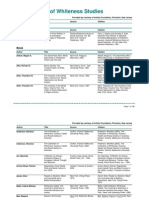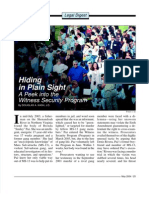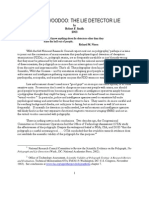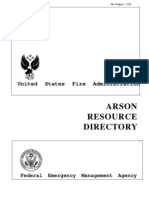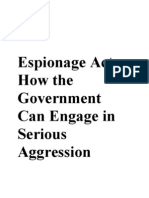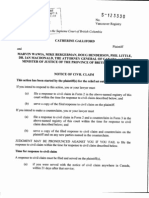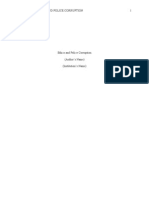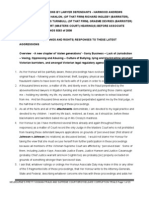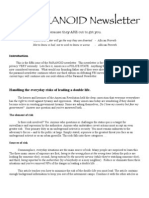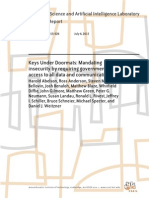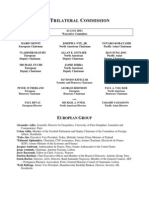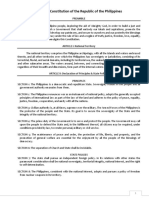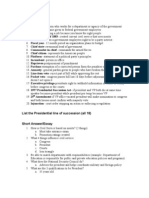NSA Speech May '15
NSA Speech May '15
Uploaded by
wellsbennettCopyright:
Available Formats
NSA Speech May '15
NSA Speech May '15
Uploaded by
wellsbennettCopyright
Available Formats
Share this document
Did you find this document useful?
Is this content inappropriate?
Copyright:
Available Formats
NSA Speech May '15
NSA Speech May '15
Uploaded by
wellsbennettCopyright:
Available Formats
1
NOT FOR DISTRIBUTION, QUOTATION, OR ATTRIBUTION
BEFORE 15 MAY 2015, 10:30 AM EST
Forty Years After Church-Pike: Whats Different Now?
Address at the National Security Agency
May 15, 2015
By Joel F. Brenner1
_____
[ACKNOWLEDGMENTS:
Bill Williams]
You honor me greatly by inviting me back to address you today.
I hope to prove worthy of it.
About ten years ago, when I was the inspector general here, I
found myself one day in Hawaii, under the Pineapples, and by
coincidence there was at the same time a conference nearby of the
agencys training staff from all over the Pacific region. And one of
them came to me and said, We do all this training about the legal
restrictions on our activities -- USSID 18 and Executive Order 12333
and all that and we know its a big deal, but none of the people
were training know why were doing it. And then after a pause she
said: And frankly, were not sure either.
I had lived through the upheavals of the late sixties and the
seventies the Vietnam War, the intelligence scandals, the Nixon
1
Joel Brenner was the Inspector General of the National Security Agency from 2002-2006; the
National Counterintelligence Executive in the Office of the Director of National Intelligence from
2006-2009; and senior counsel at NSA from 2009-10. He now maintains a private law and
consulting practice and is the Robert F. Wilhelm Fellow at the Massachusetts Institute for
Technologys Center for International Studies.
impeachment, and the implementation of the legislative and
regulatory framework that we impliedly refer to every time we say that
this agency operates under law. Younger people had not.
We Americans dont take instructions well if we dont
understand the reasons for them. And so I decided it was incumbent
on us to tell and re-tell the story of how and why the United States
became the first nation on earth to turn intelligence into a regulated
industry. But the story isnt entirely behind us. It continues. And so
this morning Im not only going to recount what happened in the
seventies; Im also going to address the Agencys position in the
wake of the Snowden leaks, and how we got here. Because insofar
as NSA has again been in the publics doghouse (It is certainly not in
the policymakers dog house), it is for very different reasons from
those in 1976, and that difference is worth reflecting on.
Lets go back to January 1970, when a former Army captain in
military intelligence, Christopher Pyle, disclosed in the Washington
Monthly that the U.S. Army intelligence had more than a thousand
plainclothes agents surveilling every significant political
demonstration in the United States.2 According to Pyles account, the
Army kept files on the membership, ideology, programs, and
practices of virtually every activist political group in the country . . .
including . . . the Southern Christian Leadership Conference, Clergy
and Laymen United Against the War in Vietnam, the American Civil
2
Christopher H. Pyle, "CONUS Intelligence: The Army Watches Civilian Politics," Washington
Monthly I, January 1970, 4; reproduced in Congressional Record (hereafter cited as Cong.
Rec.) 91st Cong., 2nd sess., 2227 2231.
Liberties Union, Women Strike for Peace, and the National
Association for the Advancement of Colored People.3 It also kept a
Blacklist of people who might cause trouble for the Army.4 There
had been violent, destructive race riots in Los Angeles in 1965, in
Detroit in 1967, and then in April 1968 in Washington after Rev.
Martin Luther King, Jr. was assassinated. Two months later, Bobby
Kennedy was assassinated. That same year, the Soviet Army moved
into Prague, the Fifth Republic in France nearly fell as a result of
massive domestic unrest, and Chicago during the 1968 Democratic
National Convention was the scene of serious street violence. Lest
anyone forget, we were also deep in the Cold War, early in the
Brezhnev years, and the antiwar movement unquestionably included
a small but violent far-left element. Stability was a genuine concern
of sober people.
The scope of the Armys domestic spying was nevertheless
unauthorized in law, out of control, and plainly political. In the Armys
eyes, dangerous people included Coretta Scott King, Georgia State
Representative Julian Bond, folk singer Arlo Guthrie, and former
military officers who opposed the Vietnam War. In Colorado Springs,
the leader of a church youth group attended a peaceful antiwar
protest; in response, the Army infiltrated his church. In Kansas City,
the Army asked local high schools and colleges to turn over the
names of potential trouble makers and anyone who was too far left
or too far right. Classroom statements by teachers and students
3
4
Pyle, "CONUS" Intelligence", 5 6.
Ibid.
found their way into police and Army files.5 Based on Pyles account,
Senator Sam Ervin, a conservative southern Democrat from North
Carolina and chairman of the Senate Judiciary Committee, opened
hearings, but they ran into a wall because the Executive Branch,
citing executive privilege and national security, declined to provide
much information. This episode nevertheless opened the first, small
wedge into a system of government secrecy that had been little
questioned since 1941.
The Army hearings were not the beginning of the American
publics distrust of government, but by 1970, trust was running out on
a strong ebb tide. Just to color the picture a bit brighter, in April 1970,
the United States secretly expanded the Vietnam War into Cambodia,
but the operation was leaked and produced vehement opposition. On
May 4, frightened and undisciplined Ohio National Guard troops fired
into a crowd of student demonstrators at Kent State University, killing
four and wounding nine. In July, a cabal of radicals blew up the Army
Math Research Center at the University of Wisconsin, killing a
graduate student. The Weather Underground planned further
bombings.
The sense of anxiety and pessimism was profound, and lots of
people really did seem to believe, as the song said, that we were on
Karl E. Campbell, Senator Sam Ervin and The Army Spy Scandal of 1970-1971: Balancing
National Security and Civil Liberties in a Free Society, Charlotte-Mecklenburg Historic
Landmarks Commission, at
http://www.cmhpf.org/Random%20Files/senator%20sam%20ervin.htm, citing primary sources.
5
the eve of destruction. (That song was actually written in 1964, but it
had long legs.)
On December 22, 1974, the New York Times published a frontpage story by Seymour Hersh about a CIA program called family
jewels. It began this way:
The Central Intelligence Agency, directly violating its
charter, conducted a massive, illegal domestic intelligence
operation during the Nixon Administration against the
antiwar movement and other dissident groups in the United
States, according to well-placed Government sources.
An extensive investigation by The New York Times has
established that intelligence files on at least 10,000
American citizens were maintained by a special unit of the
C.I.A. that was reporting directly to Richard Helms, then the
Director of Central Intelligence .
This article is worth your reading, or re-reading after forty-one
years and not only for the mood of the country and the revelations
themselves. It also lays out the unbelievably bad blood between the
FBI and the CIA and the intentional freezing of cooperation between
them. The seeds of the next generations intelligence problem were
there to see, unnoticed in plain view.
Just two weeks after Hershs article, in January 1975, the
Senate convened a Select Committee to Study Governmental
Operations with Respect to Intelligence Activities, chaired by Senator
Frank Church of Idaho. The Committees work had support from both
sides of the aisle. A similar committee convened in the House under
Rep. Otis G. Pike of New York, but the Senate version under Church
was the more significant. It published fourteen reports in 1975-76 on
intelligence agency activities, probably the most such comprehensive
reports in history, in any country. The reports detailed the CIAs habit
of opening our mail, NSAs domestic interception programs, and
CIAs human subject research including a notorious instance of
LSD administered to an unwitting subject who, in a hallucinating fit,
jumped out a window to his death. They also went deeply into
intelligence activities overseas as well as at home, disclosing
assassination plots against the Diem brothers of Vietnam, Patrice
Lumumba in the Congo, Gen. Ren Schneider in Chile, and Rafael
Trujillo in the Dominican Republic, as well as the failed plan to use
the Sicilian Mafia to kill Fidel Castro. Coups against the governments
of Arbenz in Guatemala and Mosadegh in Iran were also exposed.
The country was stunned by the systematic domestic
surveillance, and shocked to learn that assassination was a tool of
American foreign policy. It was as if we Americans had eaten of the
fruit of the Tree of Knowledge. We had lost our innocence and the
belief in the purity of our methods as well as our intentions.
Revelations about the FBI were, if possible, even more
stunning. For 17 years, from 1956 to 1973, the Bureau under J.
Edgar Hoover had run a covert program called COINTELPRO, for
Counterintelligence Program. It had antecedents at least back to
World War I. Its initial purpose was to assess the activities of the
Communist Party of the U.S., but it eventually included surveillance of
Senators Howard Baker and Church (who were the ranking member
and chairman of the Senate Foreign Relations Committee), the
womens movement, nearly all groups opposing the Vietnam War,
Albert Einstein, and many civil rights leaders. Hoover loathed Martin
Luther King, Jr., and after the March on Washington in 1963, he
called King the most dangerous Negro of the future in this nation
from the standpoint of communism, the Negro, and national security.
The FBI systematically bugged King's home and hotel rooms. By the
way, much of the surveillance was personally approved by Attorney
General Robert F. Kennedy who later discovered he too had been a
target of FBI surveillance.
On November 21, 1964, the FBI sent an anonymous package
to King that contained audio recordings of his sexual indiscretions
together with a letter that said: "There is only one way out for you.
You better take it before your filthy, abnormal, fraudulent self is bared
to the nation." The FBI was encouraging King to commit suicide.
Hoover, by the way, was regarded by several presidents as too
powerful to remove from office because he was known or believed to
have dossiers on them with embarrassing information.
NSA, meanwhile, was running two projects called SHAMROCK
and MINARET. SHAMROCK began in August 1945 the month
Japan surrendered and involved the collection by NSAs
predecessor, the Armed Forces Security Agency and then by NSA, of
all telegraphic traffic entering or leaving the United States. Western
Union, RCA, and ITT gave the agency direct daily access to microfilm
copies of this traffic up to 150,000 messages per month. There
was wartime precedent for this, but the scope of the collection, and its
conduct in peacetime, was a different story.
MINARET was a related project by which NSA intercepted
electronic communications of 1,650 people who were on a watch list.
There were no warrants and no judicial oversight of these activities,
which were simply assumed to be the normal activities of a foreign
intelligence agency. The targets included Senators Church and
Baker, many critics of the Vietnam War, King, Whitney Young,
Muhammad Ali, Tom Wicker of the New York Times, and Washington
Post columnist Art Buchwald. After the Church Committee disclosed
these programs, then-NSA Director Lew Allen shut them down. The
directors testimony before the Committee was the first time since
NSAs founding in 1952 that any director had publicly testified before
Congress; it was also the first time that NSAs existence was publicly
acknowledged. Before then, NSA really did stand for No Such
Agency. (Now it stands for Not Secret Anymore.)
I think it fair to say, and important to say, that everyone
associated with these various programs thought that he was a patriot
acting in the national interest. Which is precisely why subjective
notions of patriotism and national security are insufficient guides for
people and agencies that claim to operate under law in a democratic
republic. (Snowden and Hoover actually represent converse
instances of unmoored, egotistical arrogation to oneself of the right to
determine the public good. The comparison will annoy their
respective admirers. So much the better. They should think about it.)
The Church-Pike hearings were watershed events in our
nations history, psychologically as well as politically, and they led
directly to the legal structures you operate under today. President
Fords Executive Order 11905, later modified and reissued by
President Reagan as E.O. 12333 in substantially the form we now
know it; the creation of the House and Senate permanent select
committees on intelligence; the Foreign Intelligence Surveillance Act
of 1978; the Inspector General Act of 1978; and USSID 18 (originally
issued in 1980) not to mention drastic budget cuts in intelligence
all these were the direct product of the Church-Pike hearings and
reports.
Because of the hearings whose anniversary we celebrate
today, the men and women of the intelligence community operate
with a profoundly different mindset. You take orders from a
democratically elected government, and you answer to an
independent judiciary. This is the why. This is the answer to the
10
question put to me that day in Hawaii. This is the history we must
teach to our successors.
Im glad to say that NSA did not repeat the mistakes of the
period that led to the Church-Pike hearings. Okay, then, so how did
we get in the doghouse this time?
The seed of the problem was planted shortly after 9/11, when
the White House determined to undertake certain collection outside
the FISA regime under a highly classified, but now mostly
declassified, program called STELLAR WIND.6 That program was
not SAPed, because the creation of a new special access program
requires Congressional notification, but it was run directly by the
Office of the Vice President and put under the direct personal control
of the Vice Presidents counsel, David Addington. Under periodically
renewed Presidential orders, NSA collected two kinds of intelligence:
First, the contents of communications between a person outside the
United States with a known connection to Al Qaeda or certain
affiliated organizations, and a person inside the country; and second,
bulk metadata in order to chain off the domestic link. In my judgment,
any President who had failed to order such surveillance on an
emergency basis immediately after 9/11 would have been derelict.
The Presidents first duty is to protect the nation, and the fear of
further attack was palpable. You could smell it. But under statute,
the interceptions were not permissible without a FISA order because
they were taken from a wire inside the United States; and FISA did
6
The orders themselves have not been declassified, so far as I know.
11
not permit metadata collection at all. Under prevailing law, metadata,
which is analogous to the information on the outside of a mailed
envelope, may have had no Constitutional protection. But the bulk
collection of that data was a watershed political event in the history of
American intelligence and in American politics. As an emergency
matter, theres no question in my mind that the President had the
power under Article II of the Constitution to order this collection both
kinds. But how long does an emergency last? (An emergency
usually doesnt come with a specific expiration date like a quart of
milk, but claims of emergency do get sour.)
Now, it was the view in the White House that the President did
have the power to collect this intelligence on a permanent basis. And
I am persuaded that the White House, and certainly the Office of the
Vice President, believed that FISA was an unconstitutional limitation
on the Presidents Article II power in all circumstances. This was an
odd view, because Article I, Section 8 of the Constitution gives
Congress the power to regulate interstate and foreign commerce, and
that includes telecommunications. Under well-settled law, Congress
cannot exercise its power in a manner that makes it impossible for
the Executive to carry out its Constitutional duties, but it can regulate
that exercise in a reasonable manner.
Both the NSA General Counsel at the time, Bob Deitz, and I
looked for guidance in this situation to one of the more famous
passages of Twentieth Century Constitutional law, and Im going to
read you a short bit of it. Its by Justice Robert Jackson, concurring in
12
the Supreme Courts decision striking down President Trumans
seizure of the steel mills on national security grounds. Jackson is
talking about Presidential power in a divided government and the
point at which law and politics cannot be separated. The Presidents
power fluctuates, Jackson observed, depending upon Congress
exercise of its power. He saw three possibilities:7
1. When the President acts pursuant to an express or implied
authorization of Congress, his authority is at its maximum,
for it includes all that he possesses in his own right plus all
that Congress can delegate.
2. When the President acts in the absence of either a
congressional grant or denial of authority, he can only rely
upon his own independent powers, but there is a zone of
twilight in which he and Congress may have concurrent
authority, or in which its distribution is uncertain. In this
area, any actual test of power is likely to depend on the
imperatives of events and contemporary imponderables
rather than on abstract theories of law.
3. When the President takes measures incompatible with the
expressed or implied will of Congress, his power is at its
lowest ebb .
Youngstown Sheet & Tube Co. v. Sawyer, 343 U.S. 579, 635 (1952).
13
In my view, President Bushs STELLAR WIND orders fell into
the third category at least, I thought they did after some fairly brief
but indeterminate emergency. (This was not the Administrations
view. They thought the Authorization for Use of Military Force
impliedly granted the power to implement STELLAR WIND. That was
a serious argument, but it was based on debatable inferences; so
even accepting that view, I thought the President was in the twilight
zone.) You may know that after President Lincoln unilaterally
suspended habeas corpus during the Civil War on the grounds that it
was necessary to save the Union, he went to Congress to get his
action ratified. President Bush chose not to do that. So I put the
question to NSAs senior leadership: Why dont we amend FISA,
which we could easily have done in the aftermath of 9/11, and do this
collection under statute? This was actually an academic question,
because policy was being driven, and driven hard, by Addington, who
detested the FISA statute. Were one bomb away from getting rid of
that obnoxious [FISA] court, he would say.8 But the answer I got
here at the Fort was interesting. It was that amending FISA would
require a public debate; that the public debate would educate our
adversaries; and that we would lose intelligence as a result. My
response was that the program could not be kept secret forever, and
that its eventual disclosure would create a firestorm and divide the
country. The broad unity of the country behind the agencys activities
was a strategic asset; the loss of collection was likely to be tactical
and temporary; and sacrificing a strategic asset for tactical advantage
8
Jack Goldsmith, The Terror Presidency: Law and Judgment Inside the Bush Administration
(New York: W.W. Norton & Co., 2007), p. 181.
14
was as foolish in politics as it is in military operations. Better, I said,
to amend the statute. But Inspectors General do not make policy,
and they are not consulted about it, nor should they be.
Sooner or later this programs cover was going to be blown,
and on December 16, 2005, it happened: The New York Times
exposed the interception part of the program (but not the bulk
metadata portion), amid accusations that NSA was engaged in
domestic spying because it was intercepting communications
involving Americans. In my view that was a distorted description, but
when youre explaining, youre losing. This was the beginning of a
shift in public opinion that until then had, on the whole, been highly
supportive of our intelligence agencies. Suddenly we faced a country
that was seriously divided about our activities.
Most of the criticism actually had little to do with the merit of the
interceptions, just the authority for it. Nor surprisingly, the
inflammatory publicity attendant on the STELLAR WIND disclosure
and the resulting damage to actual collection, to NSAs reputation,
and to our public support were far greater than any damage that
would have occurred if the program, and the reasons for it, had been
publicly discussed at the outset and the FISA statute amended.
Ladies and gentlemen, democracies distrust power and secrecy
and are right to do so. Intelligence agencies are powerful and secret.
To square that circle, two conditions must be met: The rules under
which they operate must be clear to the public and authorized by law,
15
and the public must have reason to believe that the rules are being
followed. STELLAR WIND failed to meet those requirements, and
NSA paid for it in loss of public trust.
Again, a lesson was learned but imperfectly. FISA was
amended in 2008, but only after a rancorous public debate, and the
statute is frankly a bit of a mess. Still, you follow that statute.
And then in 2013 came Mr. Snowden. Overseas, people were
stunned to learn how extremely good NSA really is at its business
sometimes at their expense. You were being criticized for being too
good. And of course the dough of outrage rose higher and higher
when leavened with the yeast of hypocrisy.
But why did the Snowden leaks hurt so badly here in our own
country? There hasnt been even a whiff of intelligence abuse for
political purposes. This was the only intelligence scandal in history
involving practices approved by Congress and the federal courts and
the President, and subject to heavy oversight. How did this happen?
The answer, I think, goes back to the power-and-secrecy
principle and to the evolution of our representative democracy in the
digital age. NSA was operating under statute but ordinary,
intelligent, educated Americans could not have looked at that statute
and understood that it meant what the FISA Court interpreted it to
mean. The intelligence committees knew. Any member of Congress
who wanted to know either did know or could have known. (I
16
discount the hypocrisy from that quarter, and the Second Circuit
Court of Appeals opinion last week is just wrong about that.) But it is
true that the FISA Courts expansive interpretation of the law was
secret. So the argument that the Agency was operating under secret
law had legs with the public, much of which is allergic to bulk
collection and doubts its value.
We had amended FISA, yes, but our leaders had failed to
absorb the transparency lesson. You now live in a glass house. How
could anyone think the bulk collection program would remain secret?
Im not telling you there are no more secrets. You still have plenty of
them. I am telling you that with instantaneous electronic
communications, secrets are hard to keep; and that which can be
kept secret does not stay secret for long. The idea that the broad
rules governing your activities not specific operations, but the broad
rules can be kept secret is a delusion. And they should not be kept
secret. Leaders who do not understand this will continue to make
strategic blunders. I do not state this as a policy preference. I state it
as a fact of life that political leaders and intelligence agencies I
mean you must take into account as you make decisions about
what can be, and should be, kept secret and about what activities
you can and should undertake.
I should note that even if the general counsel or the Director
had given different advice to President Obama about bulk collection,
it would not have been followed. The fight in 2008 was bruising
enough. The White House had no appetite for more FISA battles. In
17
any case, that was the Presidents call not the Directors. The
Director was on the right side of the law. Would the program be
unpopular? Maybe. But we do our work. We keep our heads down.
Sometimes we take some punches for it. Besides, theres always a
political faction that doesnt like us no matter what. Tough luck. If its
legal, we do our work.
But in retrospect theres a lesson to learn. The public, not just
the three branches of government, must know what kinds of things
we are allowed to collect domestically.
If you disagree with me on this, do your own damage
assessment. In the wake of Snowden, our country has lost control of
the geopolitical narrative; our companies have lost more than $100
billion in business and counting. Collection has surely suffered. The
damage from the Snowden leaks to American foreign intelligence
operations, to American prestige, and to American power not to
mention the damage to morale and to personnel retention right here
at Fort Meade has unquestionably been vastly greater than if the
Executive Branch had determined from the outset to amend FISA
back in 2002 to permit the activities the White House felt necessary to
protect the country.
Do you reply that the Congress in late 2002 or in 2002 might
not have permitted NSA to do it? I doubt it. But even so, in a
functioning representative democracy, this Agency cannot keep the
18
nation safer than the nation, acting through its elected
representatives, wants to be kept.
We learned the hard lessons of 1976. Lets now think hard and
learn this lesson too. And lets teach it to those who come after us.
Thank you for the opportunity to address you. What you do is
enormously important, and I count it a great privilege to have served
among you.
You might also like
- Chapter 11 - Military OccupationDocument87 pagesChapter 11 - Military Occupationwellsbennett64% (14)
- Proclaimation and Declaration of Independence To President Donald John Trump (4) (Signed)Document2 pagesProclaimation and Declaration of Independence To President Donald John Trump (4) (Signed)USWGO Brian D. Hill71% (7)
- Adam Benforado - UnfairDocument16 pagesAdam Benforado - UnfairPradeep NagarajNo ratings yet
- Averted School IncidentsDocument44 pagesAverted School IncidentsLexipol_Media_Group100% (2)
- Ohio Inspector General's Report On Marion Correctional InstituteDocument50 pagesOhio Inspector General's Report On Marion Correctional InstituteWCPO 9 News100% (1)
- Bulmer, Solomos RACISMDocument477 pagesBulmer, Solomos RACISMIvan Hanzo Andabak100% (4)
- KRCR-Newsroom@Sbgtv - Com 20180413 090432Document8 pagesKRCR-Newsroom@Sbgtv - Com 20180413 090432JoshNo ratings yet
- Saguisag vs. Ochoa DigestDocument7 pagesSaguisag vs. Ochoa DigestKarla AcotNo ratings yet
- Eight Types of Childhood Environments THDocument7 pagesEight Types of Childhood Environments THRituei ZNo ratings yet
- Deaths and Torture in Us Custody Commands Responsibility Feb2006Document82 pagesDeaths and Torture in Us Custody Commands Responsibility Feb2006Guy RazerNo ratings yet
- Capital Punishment in Texas: Images of InjusticeDocument35 pagesCapital Punishment in Texas: Images of InjusticeProgressTX100% (1)
- Disney ResourcesDocument22 pagesDisney ResourcesThePoliticalHatNo ratings yet
- The School That Tried To End Racism Student WorksheetDocument4 pagesThe School That Tried To End Racism Student WorksheetBarburiceanu IrinaNo ratings yet
- Theo Haubrich Critical Course Reflection-1Document6 pagesTheo Haubrich Critical Course Reflection-1api-533700616No ratings yet
- Girls, Gangs and Crime-The Profile of The Female OffenderDocument16 pagesGirls, Gangs and Crime-The Profile of The Female OffenderLiLiThBLaCkNo ratings yet
- Court Documents: FBI Translator Married ISIS LeaderDocument9 pagesCourt Documents: FBI Translator Married ISIS LeaderDetroit Free PressNo ratings yet
- Abu Zubaydah Declaration and Unsealed MotionDocument79 pagesAbu Zubaydah Declaration and Unsealed MotionJason LeopoldNo ratings yet
- Bibliography of Whiteness StudiesDocument182 pagesBibliography of Whiteness StudiesRajendra PrasadNo ratings yet
- AFF - Implicit Bias Training - NDCADocument51 pagesAFF - Implicit Bias Training - NDCAPeyton TanNo ratings yet
- FBI - A Study of Active Shooter Incidents in The United States Between 2000 and 2013Document47 pagesFBI - A Study of Active Shooter Incidents in The United States Between 2000 and 2013PBS NewsHourNo ratings yet
- The New American "Police Under Fire" Issue, September 21, 2015Document48 pagesThe New American "Police Under Fire" Issue, September 21, 2015William N. GriggNo ratings yet
- Toch 1961 - Legal and Criminal PsychologyDocument456 pagesToch 1961 - Legal and Criminal PsychologyAlejandroNo ratings yet
- Strahlenfolter Stalking - TI - Aaron Alexis - Navy Yard Shooter Had Mind Control Group ContactDocument10 pagesStrahlenfolter Stalking - TI - Aaron Alexis - Navy Yard Shooter Had Mind Control Group ContactOlaf-Schmidke100% (1)
- Hiding in Plain Sight: A Peek Into The Witness Security ProgramDocument9 pagesHiding in Plain Sight: A Peek Into The Witness Security Programvalefar100% (1)
- Padilla v. Kentucky, 559 U.S. 356 (2010)Document40 pagesPadilla v. Kentucky, 559 U.S. 356 (2010)Scribd Government DocsNo ratings yet
- Virtual Voodoo - The Lie Detector LieDocument16 pagesVirtual Voodoo - The Lie Detector LieRobert F. Smith100% (2)
- Constitutionality of Regulating False StatementsDocument26 pagesConstitutionality of Regulating False StatementsNiranjan Nair100% (1)
- Fa 074Document120 pagesFa 074mirage1437No ratings yet
- Week 6 Readings - Eyewitness Testimony and Memory BiasesDocument3 pagesWeek 6 Readings - Eyewitness Testimony and Memory Biases7ThorHimmelNo ratings yet
- The Diversity MythDocument14 pagesThe Diversity MythRafaelianNo ratings yet
- Gender TroubleDocument4 pagesGender TroubleDuomma HathawayNo ratings yet
- United States v. Donald J. Paone, Anthony M. Colombo, Joseph R. Rossi, A/K/A "The Hop", Thomas E. Marotta, Richard J. Marino, Rene Piccarreto, and Samuel J. Russotti, A/K/A "Red", 782 F.2d 386, 2d Cir. (1986)Document14 pagesUnited States v. Donald J. Paone, Anthony M. Colombo, Joseph R. Rossi, A/K/A "The Hop", Thomas E. Marotta, Richard J. Marino, Rene Piccarreto, and Samuel J. Russotti, A/K/A "Red", 782 F.2d 386, 2d Cir. (1986)Scribd Government DocsNo ratings yet
- NCAVC Policy Implementation Guide PDFDocument27 pagesNCAVC Policy Implementation Guide PDFatjoerossNo ratings yet
- Espionage Act: How The Government Can Engage in Serious AggressionDocument17 pagesEspionage Act: How The Government Can Engage in Serious AggressionMichael Drew PriorNo ratings yet
- Introduction International Cooperation ADocument26 pagesIntroduction International Cooperation AAsmaa SaoudNo ratings yet
- Drumming Up Resentment: The Anti-Indian Movement in MontanaDocument48 pagesDrumming Up Resentment: The Anti-Indian Movement in MontanaJacqueline Keeler67% (3)
- 5 Fallacies of RacismDocument2 pages5 Fallacies of RacismMichael Muhammad100% (1)
- Fallacies Psychological Warfare1Document35 pagesFallacies Psychological Warfare1Jiggs VillasNo ratings yet
- Catherine Galliford Statement of Claim in Civil Suit Against RCMPDocument25 pagesCatherine Galliford Statement of Claim in Civil Suit Against RCMPProvinceNewspaperNo ratings yet
- Extract From Release - 5Document20 pagesExtract From Release - 5Lucien BruggemanNo ratings yet
- White Paper Report On Excited Delirium Syndrome (ACEP)Document22 pagesWhite Paper Report On Excited Delirium Syndrome (ACEP)Wews WebStaffNo ratings yet
- Stan J Caterbone International Signal Control or ISC Whistleblowing History and Mind Control Relationships September 21, 2015 Copyright 2015Document199 pagesStan J Caterbone International Signal Control or ISC Whistleblowing History and Mind Control Relationships September 21, 2015 Copyright 2015Stan J. CaterboneNo ratings yet
- Police CorruptionDocument8 pagesPolice Corruptionina823No ratings yet
- Alpert and Noble LiesDocument18 pagesAlpert and Noble LiesPaulNo ratings yet
- Mike HestrinDocument4 pagesMike HestrinMike Hestrin Files100% (2)
- Persecution of A Whistleblower by Outrageously Corrupt LouisianaDocument105 pagesPersecution of A Whistleblower by Outrageously Corrupt LouisianaJane DNo ratings yet
- Natoli: Au Revoir, Voir Dire and Other Costly and Socioeconomically Unjust Judicial PracticesDocument25 pagesNatoli: Au Revoir, Voir Dire and Other Costly and Socioeconomically Unjust Judicial PracticesNew England Law ReviewNo ratings yet
- Black Lives Matter GoalsDocument2 pagesBlack Lives Matter GoalsChad Whitehead0% (1)
- Human Trafficking in Mexico Jan 12Document40 pagesHuman Trafficking in Mexico Jan 12UNHCR_ThailandNo ratings yet
- Lawyers)Document23 pagesLawyers)James JohnsonNo ratings yet
- Top 10 Mistakes in Sexual Assault and Indecency With A Child CasesDocument9 pagesTop 10 Mistakes in Sexual Assault and Indecency With A Child CasesMichael Lowe, Attorney at LawNo ratings yet
- Paranoid 5Document12 pagesParanoid 5ownfowdfnopiNo ratings yet
- U Wpath Plus Report Plus and Plus FilesDocument242 pagesU Wpath Plus Report Plus and Plus FilesAdan Salazar0% (1)
- Sources For Forced Sterilization and Eugenics Program NHD NationalsDocument27 pagesSources For Forced Sterilization and Eugenics Program NHD Nationalsapi-453652237No ratings yet
- Community Based Surveillance Training ManualDocument48 pagesCommunity Based Surveillance Training ManualDana_niaNo ratings yet
- TrailsCarolinaLetter2 12 24 Docx12Document2 pagesTrailsCarolinaLetter2 12 24 Docx12kc wildmoonNo ratings yet
- Registered for Life: Consequences of a Former Sex OffenderFrom EverandRegistered for Life: Consequences of a Former Sex OffenderRating: 1 out of 5 stars1/5 (1)
- Privacy at Risk: The New Government Surveillance and the Fourth AmendmentFrom EverandPrivacy at Risk: The New Government Surveillance and the Fourth AmendmentRating: 5 out of 5 stars5/5 (1)
- Beyond White Superiority Syndrome Conditioning In AmericaFrom EverandBeyond White Superiority Syndrome Conditioning In AmericaNo ratings yet
- Trusting the Police: Comparisons across Eastern and Western EuropeFrom EverandTrusting the Police: Comparisons across Eastern and Western EuropeNo ratings yet
- The Transparency Fix: Secrets, Leaks, and Uncontrollable Government InformationFrom EverandThe Transparency Fix: Secrets, Leaks, and Uncontrollable Government InformationNo ratings yet
- PrecedentialDocument47 pagesPrecedentialwellsbennettNo ratings yet
- Petition For Rehearing en Banc (27 July 2015)Document85 pagesPetition For Rehearing en Banc (27 July 2015)wellsbennettNo ratings yet
- Hamidullan MTD OrderDocument42 pagesHamidullan MTD OrderwellsbennettNo ratings yet
- File Stamped Graham PetitionDocument13 pagesFile Stamped Graham PetitionwellsbennettNo ratings yet
- Chapter 16 - Cyber OperationsDocument16 pagesChapter 16 - Cyber OperationswellsbennettNo ratings yet
- Mit Csail TR 2015 026 UpdatedDocument34 pagesMit Csail TR 2015 026 Updatedwellsbennett100% (1)
- Nuclear Deal TextDocument159 pagesNuclear Deal TextZerohedge100% (1)
- Chapter 18 - Enforcement of Law of WarDocument79 pagesChapter 18 - Enforcement of Law of WarwellsbennettNo ratings yet
- Chapter 15 - Law of NeutralityDocument65 pagesChapter 15 - Law of NeutralitywellsbennettNo ratings yet
- Chapter 14 - Air and Space WarfareDocument29 pagesChapter 14 - Air and Space WarfarewellsbennettNo ratings yet
- Chapter 6 WeaponsDocument98 pagesChapter 6 WeaponswellsbennettNo ratings yet
- Chapter 13 - Naval WarfareDocument40 pagesChapter 13 - Naval WarfarewellsbennettNo ratings yet
- Chpater 5 - Conduct of HostilitiesDocument129 pagesChpater 5 - Conduct of Hostilitieswellsbennett100% (1)
- Chapter 9 POWsDocument133 pagesChapter 9 POWswellsbennettNo ratings yet
- Chapter 4 - Classes of PersonsDocument85 pagesChapter 4 - Classes of PersonswellsbennettNo ratings yet
- United States Foreign Intelligence Surveillance Cffefn' Washington, D.CDocument13 pagesUnited States Foreign Intelligence Surveillance Cffefn' Washington, D.CwellsbennettNo ratings yet
- 084-1 (20150424) Opposition MemorandumDocument34 pages084-1 (20150424) Opposition MemorandumwellsbennettNo ratings yet
- Trilateral Commission - Membership List 8-2011Document18 pagesTrilateral Commission - Membership List 8-2011Utopian ResearchNo ratings yet
- Nixon v. Fitzgerald, 457 U.S. 731 (1982)Document58 pagesNixon v. Fitzgerald, 457 U.S. 731 (1982)Scribd Government DocsNo ratings yet
- Kuglof Iz PekačaDocument27 pagesKuglof Iz PekačaArnela564No ratings yet
- T64 PDFDocument24 pagesT64 PDFÁlvaro Sánchez AbadNo ratings yet
- CLJ 1 Intro To The Philippine Criminal Justice SystemDocument30 pagesCLJ 1 Intro To The Philippine Criminal Justice SystemLove LoveNo ratings yet
- Doctrine of Executive PrivilegeDocument48 pagesDoctrine of Executive PrivilegeLariza AidieNo ratings yet
- Pinay Jurist: Bar Exam 2016 Suggested Answers in Political LawDocument41 pagesPinay Jurist: Bar Exam 2016 Suggested Answers in Political LawJohn Kayle BorjaNo ratings yet
- PHilippine Association of Service Exporters C. TorresDocument14 pagesPHilippine Association of Service Exporters C. TorresSeonoNo ratings yet
- Delhi Metropolitan Education NoidaDocument24 pagesDelhi Metropolitan Education Noidavarunendra pandeyNo ratings yet
- KISSINGER THE SECRET SIDE OF THE SECRETARY OF STATE A Book by Gary Allen-80 PDFDocument80 pagesKISSINGER THE SECRET SIDE OF THE SECRETARY OF STATE A Book by Gary Allen-80 PDFKeith Knight100% (3)
- Definition of Terms Under EO 292, S. 1987Document4 pagesDefinition of Terms Under EO 292, S. 1987AnneNo ratings yet
- Eo 708Document12 pagesEo 708Mae CastroNo ratings yet
- Session 5 - Overview - The-Philippine-Government-BarlisDocument18 pagesSession 5 - Overview - The-Philippine-Government-BarlisCathy Pascual NonatoNo ratings yet
- Assumption of Office of President Bill 2012 PublishedDocument10 pagesAssumption of Office of President Bill 2012 PublishedMakofia MikeNo ratings yet
- Constitution and by Laws of The EnglishDocument27 pagesConstitution and by Laws of The EnglishJennylou PagaoNo ratings yet
- Laws On Public OfficersDocument107 pagesLaws On Public OfficersFritche Ann MontañezNo ratings yet
- The 1987 Constitution of The Republic of The PhilippinesDocument42 pagesThe 1987 Constitution of The Republic of The PhilippinesAngel Agustine O. Japitan IINo ratings yet
- Roles of US PresidentDocument1 pageRoles of US Presidentcrative903No ratings yet
- San Agustin Nhs PTA CBLDocument6 pagesSan Agustin Nhs PTA CBLAMIELNo ratings yet
- Nicanor TAVORA, Petitioner, BONIFACIO N. GAVINA and PEDRO O. ARCIAGA, RespondentsDocument6 pagesNicanor TAVORA, Petitioner, BONIFACIO N. GAVINA and PEDRO O. ARCIAGA, RespondentsGio RuizNo ratings yet
- The Old Aguata Union Constitution AmendmentDocument37 pagesThe Old Aguata Union Constitution AmendmentIgwebuike UzochukwuNo ratings yet
- Branches of GovernmentDocument66 pagesBranches of GovernmentKhay AnnNo ratings yet
- Soliven v. Makasiar, 167 Scra 393Document1 pageSoliven v. Makasiar, 167 Scra 393kaye caipangNo ratings yet
- Contitutional Law Case DigestDocument41 pagesContitutional Law Case DigestLois DNo ratings yet
- Document 1 28Document48 pagesDocument 1 28VictorNo ratings yet
- UUD 1945 English VersionDocument19 pagesUUD 1945 English VersionmarcoserasmoNo ratings yet
- Executive Branch Study Guide W/answersDocument2 pagesExecutive Branch Study Guide W/answersshanestevens100% (5)
- Felixberto Sta Maria Vs Salvador LopezDocument45 pagesFelixberto Sta Maria Vs Salvador LopezRafael SampayanNo ratings yet

















